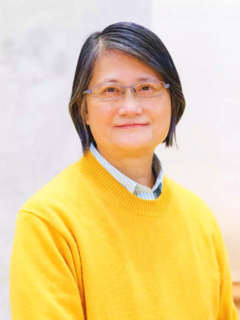Introduction of the Research Hub:
Welcome to the AI Research Hub for the Department of English Language Education! This innovative space is dedicated to exploring the intersection of artificial intelligence and language education. Our hub aims to advance research, foster collaboration and enhance teaching practices through the integration of AI technologies.
In an era where technology is reshaping education, our hub provides a platform for students, faculty, and researchers to delve into the potential of AI in language learning and teaching.
We invite students, educators, and researchers to join us in this exciting endeavor. Together, we can push the boundaries of English language education, leveraging AI to create more inclusive, effective, and forward-thinking learning environments. Welcome to the forefront of language education innovation!
Members Information:

LIN, Mei Yi Angel
Chair Professor of Language, Literacy and Social Semiotics in Education
Contact Information: angellin@eduhk.hk
Office: B4-2/F-02
Dr. Angel M. Y. Lin is Chair Professor of Language, Literacy and Social Semiotics in Education at the Education University of Hong Kong. Dr. Lin has been at the forefront of English language education and critical literacies since the late 1990s when she started working on classroom research projects in schools in Hong Kong. She has published widely on second language education, discourse analysis, trans/languaging (TL), trans-semiotizing (TS), Content and Language Integrated Learning (CLIL), and critical media literacies. Her current research focuses on exploring ethical engagement with AI, plurilingualizing assessment through applying the PAA Model and 4T Lenses.
Research Interests: The PAA (Plurilingualism, Affect, Agency) Model and 4T Lenses: Translanguaging (TL), Trans-semiotizing (TS), Transknowledging (TK), Transculturing (TC); Content and Language Integrated Learning (CLIL), critical media literacies, and critical AI literacies.
Selected publications:
1. Lin, A. M. Y, & Chen, Q. (2024). How intelligent is generative AI? Towards trans-semiotizing the Turing Test. Multimodality & Society, 4(2): 162-174. doi: 26349795241241315.
2. Tsou, W., Lin, A. M. Y., & Chen, F. (2024). Co-journeying with ChatGPT in tertiary education: identity transformation of EMI teachers in Taiwan. Language, Culture and Curriculum, 1-15.
3. Moorhouse, B. L., Wan, Y., Ho, T. Y., & Lin, A. M. Y. (2024). Generative AI-assisted, evidence-informed use of L1 in L2 classrooms. ELT Journal, ccae033.
.png)
LEE, Ju Seong
Acting Head and Assistant Professor of the Department of English Language Education
Contact Information: jslee@eduhk.hk
Office: B4-1/F-47
Dr. Lee developed the IDLE model, which is increasingly recognized for its positive impact on student learning. He has worked with an AI company to implement the AI-IDLE model in schools across Indonesia. Lee is committed to addressing a local educational problem through innovative AI technology and an interdisciplinary team, aiming to share the findings with an international audience.
Research Interests: Informal digital learning of English (IDLE); AI-mediated IDLE; Social impact.
.png)
KOHNKE, Lucas
Senior Lecturer II
Contact Information: lmakohnke@eduhk.hk
Office: B4-1/F-07
Dr. Kohnke's research focuses on technology-supported teaching and learning, and teacher professional development with emerging technologies. He has contributed over 60 articles to leading journals such as Computers and Education: Artificial Intelligence, Educational Technology & Society, Education and Information Technologies, ReCALL, SYSTEM, and RELC Journal. His diverse teaching areas include integrating technology into language classrooms, AI in education, teacher training, and English language teaching methodologies.
Research Interests: Generative Artificial Intelligence, Teacher Professional Development Using Technology (GenAI, VR, AR), Technology-supported Teaching and Learning (GenAI, VR, AR).
.

Dr Qiao’s research interests include gamification, digital game-based learning, instructional design and artificial intelligence in education. She has published articles in reputable SSCI journals, including British Journal of Educational Technology, Language Learning & Technology and Journal of Computer AssistedLearning. Her research currently focuses on exploring whether and how AI-powered digital gamification engages language learners and promotes social interactions, thereby influencing their language learning achievement.
Research Interests: gamification, digital game-based learning, instructional design and artificial intelligence in education.

ZHANG, Yue Ellen
Yue Zhang is an Assistant Professor in the Department of English Language Education at the Education University of Hong Kong. She has earned her M.Phil. and Ph.D. in Applied English Linguistics at The Chinese University of Hong Kong. She was involved in English teaching and teacher education at the tertiary level in Mainland China for years before moving to Hong Kong. Her research focuses on the identity and investment of learners and teachers, (critical) digital literacies, informal digital learning of English (IDLE), and empowering learners and teachers with critical pedagogies and generative AI. Some of her work can be found in Language Awareness, Journal of Language, Identity, and Education, Computer Assisted Language Learning, Journal of Multilingual and Multicultural Development, TESOL Quarterly, ReCALL, System, Research Methods in Applied Linguistics, and Chinese Journal of ESP.
Research Interests: Identity and investment, (critical) digital literacies, Computer Assisted Language Learning (CALL), language teacher education, and critical inquiries and pedagogies.

NZADOROZHNYY, Artem
Postdoctoral fellow
Contact Information: archiezador@eduhk.hk
Office: B4-1F-6A
Artem Zadorozhnyy, PhD, graduated from the Education University of Hong Kong in 2022 and is currently a Post-doctoral Fellow in the Department of English Language Education at the same institution. He is a recipient of the PhD and Postdoctoral Fellowship Scheme funded by the University Grants Committee in Hong Kong. His research interests include informal digital language learning, digital and AI literacy among second language learners, and the impact of ICT on English language proficiency. His work has been published in journals such as Computer-Assisted Language Learning, ReCALL, Languages, and Technology, Knowledge and Learning.
Research Interests: Computer-assisted language learning, informal learning, AI literacy of second language learners
Selected outputs:
Zadorozhnyy*, A. & Lai, W.Y.W. (2024). ChatGPT and L2 Written Communication: A Game-Changer or Just Another Tool? Languages, 9(5). https://doi.org/10.3390/languages9010005
Invited talks:
Zadorozhnyy, A., & Kohnke, L. (2024, Sep). Integrating AI into your workflow: A hands-on approach to AI prompting and AI-enabled tools for teaching. Presented at the CALL2024 Tokyo, Japan. (Invited speaker)

CHEN, Qinghua
Postdoctoral fellow
Contact Information: cqinghua@eduhk.hk
Office: B4-1F-6A
Brief Bio: Qinghua Chen is a postdoctoral fellow at the English Language Education Department of the Education University of Hong Kong. His current research interests include subjectivity, emotions, and identity of pre-service teachers and English language learners. He is particularly interested in exploring how these factors shape teaching and learning experiences in multicultural and multilingual contexts.
Research Interests: Critical Media Literacy, Educational Technology and Artificial Intelligence, Decolonial Approaches in Education, Subjectivity and identity
Daniel Chang is a lecturer in the Faculty of Education at Simon Fraser University in Canada. His scholarly expertise brings composition studies, argumentation, teaching multilingual students, and instructional design and technology together. Recently, he’s been interested in how learners/writers use AI and integrate it as part of self-regulated learning (SRL) strategies and how educators can develop AI-based instructions that shape learners’ SRL.




